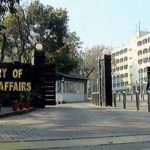The Supreme Court Thursday declared the ruling by the NA deputy speaker “unconstitutional” and ordered the restoration of National Assembly and the Cabinet, besides asking the House to meet till Saturday to proceed with the vote of no-confidence against the prime minister.
A short order signed by all the five members of the SC larger bench set aside the ruling given by the Deputy Speaker on the floor of the House on April 3 regarding the resolution for a vote of no-confidence against the prime minister under Article 95 of the Constitution, declaring it to be contrary to the Constitution and the law, and of no legal effect.
It declared that the National Assembly was in existence at all times, and continued to remain and be so.
The judgement was signed by Chief Justice of Pakistan Umar Ata Bandial, Justice Ijaz ul Ahsan, Justice Mazhar Alam Khan Miankhel, Justice Munib Akhtar and Justice Jamal Khan Mandokhail.
The order stated that the ruling of the NA deputy speaker given in relation to the resolution for a vote of no-confidence against the prime minister and in relation to which leave was granted to move the resolution on March 28, and the detailed reasons for the ruling (released subsequently and concurred with by the speaker) were declared to be contrary to the Constitution and the law and of no legal effect, and “the same are hereby set aside”.
The order declared that the resolution was pending and subsisting at all times, and continued to so remain pending and subsisting.
The court also declared that at all material times the prime minister was under the bar
imposed by the Explanation to clause (1) of Article 58 of the Constitution and continued to remain so restricted. He could not, therefore, have at any time advised the president to dissolve the assembly as contemplated by clause (1) of Article 58.
The court declared,” All actions, acts or proceedings initiated, done or taken by reason of, or to give effect to, the aforementioned order of the president and/or for purposes of holding a general election to elect a new assembly, including but not limited to the appointment of a care-taker prime minister and cabinet are of no legal effect and are hereby quashed.
“The prime minister and federal ministers, ministers of state, advisers, etc stand restored to their respective offices as on April 3.”
The court declared that the assembly was at all times, and continued to remain, in session as summoned by the speaker on March 20 for March 25, on the requisition moved by the requisite number of assembly members on March 08 in terms of clause (3) of Article 54 of the Constitution.
“Any prorogation of the assembly by the speaker prior to its dissolution in terms as stated above is declared to be of no legal effect and is set aside.
“The speaker is under a duty to summon and hold a sitting of the assembly in the present session, and shall do so immediately and in any case not later than 10:30 a.m. on Saturday April 9, to conduct the business of the House as per the Orders of the Day that had been issued for April 3 and in terms as stated in, and required by, Article 95 of the Constitution read with Rule 37 of the Rules of Procedure and Conduct of Business in the National Assembly Rules, 2007,” read the judgment.
The order further stated that “the speaker shall not, in exercise of his powers under clause (3) Article 54 of the Constitution, prorogue the assembly and bring the session to an end, except as follows: If the resolution is not passed by the requisite majority (i.e., the no-confidence resolution is defeated), then at any time thereafter; and if the resolution is passed by the requisite majority (i.e., the no-confidence resolution is successful), then at any time once a prime minister is elected in terms of Article 91 of the Constitution read with Rule 32 of the Rules and enters upon his office.
“If the resolution is passed by the requisite majority then the assembly shall forthwith, and in its present session, proceed to elect a prime minister in terms of Article 91 of the Constitution read with Rule 32 of the Rules and all other enabling provisions and powers in this behalf and the speaker and all other persons, including the Federal Government, are under a duty to ensure that the orders and directions hereby given are speedily complied with and given effect to.
“The assurance given by the learned Attorney General on behalf of the Federal Government in C.P. 2/2022 on 21.03.2022 and incorporated in the order made in that matter on the said date shall apply as the order of the court: the Federal Government shall not in any manner hinder or obstruct, or interfere with, any members of the National Assembly who wish to attend the session summoned as above, and to participate in, and cast their votes, on the no confidence resolution.
“This order of the court shall apply both in relation to the voting on the resolution and (if such be the case) in relation to the election of a prime minister thereafter. It is, however, clarified that nothing in this short order shall affect the operation of Article 63A of the Constitution and consequences thereof in relation to any member of the assembly if he votes on the resolution or (if such be the case) the election of a prime minister thereafter in such manner as is tantamount to his defection from the political party to which he belongs within the meaning of the said article.
“The order of the court made in SMC 1/2022 on 03.04.2022 to the following effect, i.e., “Any order by the prime minister and the president shall be subject to the order of this court” shall continue to be operative and remain in the field, subject to this amplification that it shall apply also to the Speaker till the aforesaid actions are completed.”






